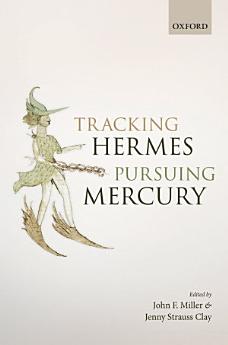Tracking Hermes, Pursuing Mercury
John F. Miller · Jenny Strauss Clay
જાન્યુ 2019 · Oxford University Press
ઇ-પુસ્તક
384
પેજ
family_home
પાત્ર
info
reportરેટિંગ અને રિવ્યૂ ચકાસેલા નથી વધુ જાણો
આ ઇ-પુસ્તક વિશે
Of all the divinities of classical antiquity, the Greek Hermes (Mercury in his Roman alter ego) is the most versatile, enigmatic, complex, and ambiguous. The runt of the Olympian litter, he is the god of lies and tricks, yet is also kindly towards mankind and a bringer of luck. His functions embrace both the marking of boundaries and their transgression, but also extend to commerce, lucre, and theft, as well as rhetoric and practical jokes. In another guise, he plays the role of mediator between all realms of human and divine activity, embracing heaven, earth, and the netherworld. Pursuing this elusive divinity requires a truly multidisciplinary approach, reflecting his prismatic nature, and the twenty contributions to this volume draw on a wide range of fields to achieve this, from Greek and Roman literature (epic, lyric, and drama), epigraphy, cult, and religion, to vase painting and sculpture. In offering an overview of the myriad aspects of Hermes/Mercury-including his origins, patronage of the gymnasium, and relation to other trickster figures-the volume attempts to track the god's footprints across the many domains in which he partakes. Moreover, in keeping with his deep connection to exchange, commerce, and dialogue, it aims to exemplify and further encourage discourse between Latinists and Hellenists, as well as between scholars of literary and material cultures.
લેખક વિશે
John F. Miller is Arthur F. and Marian W. Stocker Professor of Classics at the University of Virginia, where he has taught since 1984 and served as chair of the Department of Classics from 1999 to 2014. He is the author of Apollo, Augustus, and the Poets (CUP, 2009), which was awarded the Charles Goodwin Award of Merit by the American Philological Association, and Ovid's Elegiac Festivals: Studies in the 'Fasti' (Peter Lang, 1991), and is also the co-editor of four collaborative volumes on Greek and Roman literature and culture. From 1991 until 1998 he was the Editor of Classical Journal. Jenny Strauss Clay is William R. Kenan Jr. Professor of Classics Emerita at the University of Virginia, where she taught for 37 years, alongside holding visiting professorships at Duke University, the École des Hautes Etudes, Paris, and the École Normale, Lyon. She has served as the President of the Classical Association of the Midwest and South and of the American Philological Association, and is the author of The Wrath of Athena: Gods and Men in the Odyssey (PUP, 1983), The Politics of Olympus: Form and Meaning in the Major Homeric Hymns (PUP, 1989), Hesiod's Cosmos (CUP, 2003), and Homer's Trojan Theater: Space, Vision, and Memory in the Iliad (CUP, 2011). In 2012-13 she was awarded a Humboldt Stiftung Preis.
આ ઇ-પુસ્તકને રેટિંગ આપો
તમે શું વિચારો છો અમને જણાવો.
માહિતી વાંચવી
સ્માર્ટફોન અને ટૅબ્લેટ
Android અને iPad/iPhone માટે Google Play Books ઍપ ઇન્સ્ટૉલ કરો. તે તમારા એકાઉન્ટ સાથે ઑટોમૅટિક રીતે સિંક થાય છે અને તમને જ્યાં પણ હો ત્યાં તમને ઑનલાઇન અથવા ઑફલાઇન વાંચવાની મંજૂરી આપે છે.
લૅપટૉપ અને કમ્પ્યુટર
Google Play પર ખરીદેલ ઑડિઓબુકને તમે તમારા કમ્પ્યુટરના વેબ બ્રાઉઝરનો ઉપયોગ કરીને સાંભળી શકો છો.
eReaders અને અન્ય ડિવાઇસ
Kobo ઇ-રીડર જેવા ઇ-ઇંક ડિવાઇસ પર વાંચવા માટે, તમારે ફાઇલને ડાઉનલોડ કરીને તમારા ડિવાઇસ પર ટ્રાન્સફર કરવાની જરૂર પડશે. સપોર્ટેડ ઇ-રીડર પર ફાઇલો ટ્રાન્સ્ફર કરવા માટે સહાયતા કેન્દ્રની વિગતવાર સૂચનાઓ અનુસરો.








